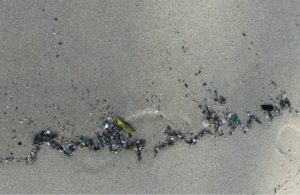I Would Choose No Straw!
Academy Fellow, Marissa Jablonski PhD, is a development engineer and educator who collaborates and cooperates with transdisciplinary groups worldwide wrestling with complex concerns related to water, sustainability, and culture. In this blog, Marissa shares her recent experience working with hotels in Phuket, Thailand to eliminate single-use plastics in their rooms.
WHAT IF YOUR NAME GOT WRITTEN ONTO EVERY PIECE OF PLASTIC YOU USED… and when you watched the gruesome YouTube video that went viral of two scientists helping a distressed sea turtle by pulling a straw out of its nose, the straw read YOUR NAME? When the plastic bags were pulled out of dead whale’s belly, or out of a cow’s mouth, they read your name? If you were directly responsible for the pain and suffering of other innocent beings on the planet, and you saw it, then would you stop using plastic? I’m here to tell you that you would because you care. We all do.
In the time that it takes to read this blog ten million plastic bottles and ten million plastic bags will have been used and tossed aside. We are creating mountains, islands of plastic, and even sand made of plastic. Even though it’s directly in front of our faces, we don’t seem to see it, and we can’t seem to stop.
I am currently stationed in Phuket, Thailand working on a collaborative project started by the Phuket Hotels Association and the United States Embassy in Thailand. The project helps hotels eliminate single-use plastics in their rooms, from their housekeeping, laundry, restaurants, kitchens, fitness, spa, around their pools, and ultimately from their beaches. The hotels in Phuket, Thailand have watched tourism drop in other destinations like Bali, Indonesia due to plastic litter on their beaches and in their ocean. So, 70 Phuket member hotels, with over 20,000 collective employees, are trying to proactively prevent it from happening here.
How do we start?
From the top down, with government policy? Or from the bottom up, with individual education and campaigning? I get asked this question everyday and my response is always the same: we need to start from the bottom up, top down, from the sides, and from the diagonal. We can’t rely only on one group and we can’t wait for someone else. We are changing behavior and moving away from convenience. It’s about changing systems. We need help from every stakeholder at every stage, every country, and every economic level.
Site visits
So, the work started with site visits. I tour a hotel every morning, and another one every afternoon. I’ve visited 45. Some hotels are already (nearly) plastic free! Almost all are still stuck on plastic trash bags, plastic wrap in kitchens, and plastic tea/coffee packaging in rooms. Some hotels, however, don’t think there’s any problem using single-use plastics. And the majority are somewhere in between.
The top 6 changes we are trying to implement are:
- Glass water bottles in rooms, in banquet halls, and for sale in restaurants.
- No plastic bags in room trash bins
- No straws at bars or restaurants unless absolutely necessary. When necessary, like with a fresh coconut, we suggest offering a paper straw, lemon grass, or even a hollow rice stalk (stainless steel is great too but not many are ready for this investment)
- Water dispensers with paper or reusable acrylic cups in the gym and near pools (it is against safety code to offer glass around the pool), and upselling glass water and pouring into a cup in front of a guest, just as is done with beer
- Compostable paper take away containers including coffee cups with lids
- Asking purchasing departments to connect with laundry services and food suppliers to bring their goods in reusable plastic bins or on carts to eliminate incoming plastic bags
Some unexpected, exciting, and extra outcomes include:
- Some hotels are investing in their own drinking water treatment and bottling plant to replace plastic bottles of water with glass
- Some hotels have changed their shampoo/conditioner/shower gels to pumps or dispensers (this is harder than it seems but we are seeing changes to brand standards that are also working towards this goal)
- Many hotels already give their kitchen food scraps to local pig and chicken farmers or dogs which keeps it out of landfills or from slowing down the municipal incinerators
The work continues as, during these site visits, I connect with managers and staff.
Beliefs
During one of the hotel visits, I asked the group of managers to play a game—let’s go around the room and say how many pieces of single-use plastic we used today. For instance, if you went to a convenience store and bought an iced coffee or tea, the cup is 1, the lid is 2, the straw is 3, the plastic wrap on the straw is 4, and the plastic bag they put it in is 5. A young man, newly hired said seven. He had used 7 single-use plastics on his way to work. The five I mentioned earlier plus a banana wrapped in plastic wrap and a bag of chips. We were all pretty excited about how eco-minded the majority of the group was, so we started optimistically talking to him about how to set himself up for success. How much is a reusable cup with lid? Where could he buy one? What about a stainless steel straw? How about a reusable bag that can fold up small and clip to his key chain? Who here can help him? Everyone volunteered and we went on our way.
While we were finishing the tour, it occurred to me that I had just talked AT him, not WITH him—none of those ideas were his; they were ideas from already practicing plastic-free people. So, I asked him if he could help me. Please, can you tell me what you are thinking? Why do you do what you do? He said that the convenience store actually offered him four plastic bags and he only took one, so he thought he was doing good. And he told me that since he’s a boy, he won’t carry all of those things with him everywhere he goes.
Whew, I was so grateful that he told me the truth. But his truth completely deflated me. Maybe we need to change the culture so men carrying a bag is the norm? Then I thought of the men in my life who don’t even carry a wallet. We have a long way to go!
Workshops
So, we also run workshops in the style of the Academy for Systems Change for clusters of hotel managers and local environmental leaders. We start by asking participants to envision what their ideal Phuket looks like in 20 years. We ask them what a perfect Phuket looks like, feels like, smells like, and even what attitudes are like. We get them out of their heads and into their hearts. Then we educate about the longevity of plastics, and warn them about the difficulties in composting bio-plastics (they require constant high temperature and microbes for 90+ days—an industry that is not yet available in Phuket). Then we show them what best practices look like and we challenge them to make the easiest change now and slowly work on the more difficult change. They break into groups starting with their individual hotels, then double the group size joining with another hotel, and finish with the whole room. We close by asking them to leverage their connections to make even bigger change. We do all of this hoping that once a group makes one change, it will be easier to make another, and another. When they discuss their stuck points with their peers at other hotels, they learn of successes and strategies of other groups which helps them get un-stuck faster.
But honestly, this is not fast enough change for me. People all over the world, still take plastic to ease their life. They don’t question it. They just go into autopilot. I think we also need to offer awareness to, and expect responsibility from, the plastic user.
I explained recently to a hotel manager that a tourist does not necessarily want to use plastic, but they aren’t given another choice. Hotels believe it’s what the tourist wants, because it’s what they ask for (not knowing there’s another option). It’s a vicious cycle. But, the service industry has options, we all have options. They can, and will, deliver filtered water to your room in a pitcher for example if you ask.
Norms are hard to change
One manager said, in response to eliminating straws, that he did not want to make beautiful women with perfect lipstick mess it up by not giving her a straw. I turned to the beautiful woman next to me and said, as stated in the first paragraph, “With all due respect, if every plastic straw you ever used had your name written on it, and the straw that they pulled from the turtle’s nose on the news and on social media read your name, what you would feel?” She made a terrible face and said “I would choose no straw!” The point is, if our actions could be directly connected to their impact on the planet we might change. If it were a human that was found with plastic bags around its intestine, the people of the world would stop consuming plastic bags. But it was a whale, and cow, and birds, and… NOT a human. We can no longer ignore the harm that our actions are having on the planet.
Key Messages:
- We use plastic bottles at a rate of 1,000,000 a minute
- Recycling a food-grade plastic bottle can never be recycled into another food-grade plastic bottle
- We only recycle about 18% of all plastic globally
- We recycle plastic into items including shoes, jackets, backpacks, bags, and even non-food grade bottles
- There is much less demand for non-food grade plastics
- Recycling glass and metal creates glass and metal, respectively
- When you throw things AWAY, there is no away. Who/what is being forced to deal with your plastic waste? Can you refuse it?
- If you justify your plastic use by saying that you ‘reuse’ plastic bags or plastic bottles, but you have a stash of hundreds in the cupboard at home, or reuse them a couple of times, but then toss them, it’s time to give them up all together!
What did our grandparents do?
We humans have lived without plastic before. We lived with bento boxes, tiffins, lunch boxes, banana leaves, and returnable glass bottles. BUT, we did it during a time when one of the adults in the house often stayed home all day. Now, we are at a time when both parents work outside the home. And, we live during a time when speed and convenience is valued. So, we need to think about our grandparents. We need to create teams. Saying no to plastic requires carrying things—containers, mugs, straws, cutlery, and bags. This gets heavy. It requires extra work. We need to help each other and hold each other accountable.
So, I start with me and my household. I have chosen to try to live a plastic free life style. When I am with others, they usually follow my lead. I don’t take the offered water bottle. I refuse to order a drink in a plastic cup and will walk out of a shop if they do not have another option, making sure that they know why they lost my business. I carry a bamboo straw with me, as well as a fork and spoon. And while I am doing this, I also am setting up meetings with hotel CEOs, and would like to set up meetings with the prime minister and king of Thailand. Why not try?
I was recently in Ubon Ratchathani for the Candle festival, celebrating spiritual renewal. Many school children were tasked with an assignment to practice their English and interview tourists about their reasons for visiting and their experience with Thai food. I took the opportunity to spread the message: “I’m in Thailand helping the government reduce plastic. I challenge you, for the remainder of this year, to refuse plastic bags. And I challenge you to refuse plastic straws next year. And in 2020, I challenge you to refuse plastic cups and lids. Will you take the challenge?” They all responded yes!
Let’s see if the change happens from the bottom up or the top down. I bet it comes from all angles. And all I can say is to try it yourself. Go a full day refusing to use single use plastics. Will you try? Go team!






Comments (2)
What about using infintely recyclable aluminum cans or bottles? They have real scrap value after consumed,
September 12, 2018 at 5:03 amThanks for your comment Gregory. Yes, aluminum cans and bottles are a viable eco-alternative as long as their use also includes an education piece about recycling since mining for new metals is very hard on the earth.
September 13, 2018 at 1:06 amComments are closed.